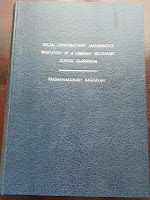My Research -Social Constructivist Mathematics Education in a Ciskeian Classroom
In my previous post, I explained how my learners' poor performances in mathematics learning prompted me to do academic research on it. And I registered with Rhodes University, Grahamstown, for a Masters's degree in Mathematics Education.
My initial research topic centred on learners' poor performance in Euclidean geometry. Later, I changed it into Social Constructivist Mathematics Education in the classroom.
This was based on my awareness that the philosophy of Mathematics determines the classroom pedagogy-how it's taught and learned in the classroom, especially at the school level.
Traditional schools of mathematics promoted objectivism in the classroom pedagogy--justifications through an axiomatic deductive approach. Axiomatic means; self-evident or unquestionable truth statement. For example, the earth is round; a line is a set of infinitely many points extending forever in both directions. An axiom is, old knowledge, use it to prove new knowledge. A learner needs not to know how the old knowledge (axiom) is constructed. This is known as objectivism in mathematics learning, which didn't prompt knowledge construction in the classrooms. This axiomatic method was used in ancient Greek mathematical sciences.
Objectivism was followed generally in western mathematical pedagogy, curriculum developments, and textbooks. Many mathematicians towards the nineteenth century had researched it and pointed out this drawback. However, by then the Western mathematical system of education had become the norm in many developing nations in Asia and Africa--including the Ciskei homeland as well South Africa. Hence, it made sense to me that teaching approaches followed in my classroom might be hindering the learner's grasp of the subject.
Social Constructivism: A Philosophy of Mathematics.
Social constructivism is the philosophical perspective in mathematics proposed by Paul Ernest. It did not characterize a new philosophy of mathematics, rather a consolidation of the two already existing philosophies: Lakato's quasi-empiricism and Wittgenstein's conventionalism. As a philosophy, it is descriptive and fallibilist as opposed to prescriptive and absolute. Its main thesis is that mathematical knowledge is a social construction.
I don't want to go further into the detailed implications of this philosophy in mathematics education.
I was teaching at Ilanga High School, where I did my research, there were two class 7 divisions with twenty-five learners; one class the research group and the other the control group. Here also, I don't want to go into the details of my research.
Conclusions of my research:
1. Social constructivist process approach in the content presentation and teaching of mathematics can produce a positive effect on the mathematical development of pupils in the Ciskeian classroom.
2.pupils in this region should be taught mathematics through social interaction as envisaged by the researcher for proper understanding. Since language is a decisive factor in the understanding of mathematics, special care should be taken by the teacher to develop both the word meaning and the mathematical meaning before presenting a concept in the medium of instruction.
In was in 1994, I got my degree in MEd. A year rewarding more so, the year South Africa became an independent nation from the colonial rule and the homelands became part of the Republic of South Africa, Nelson Mandela, the nation's first president. Apartheid got unraveled, people of all races got equal national status and racial discrimination became a thing of the past constitutionally.
This is Post no. 6, part of the BlogChatter Half Marathon



I really admire your devotion to education. You are prepared to do whatver you can and to study further in order to help students shine.
ReplyDeleteHi, Brinda, I highly appreciate you reading all my posts. I still feel for my learners who could have shone much better in life, had they got better lives.
Delete